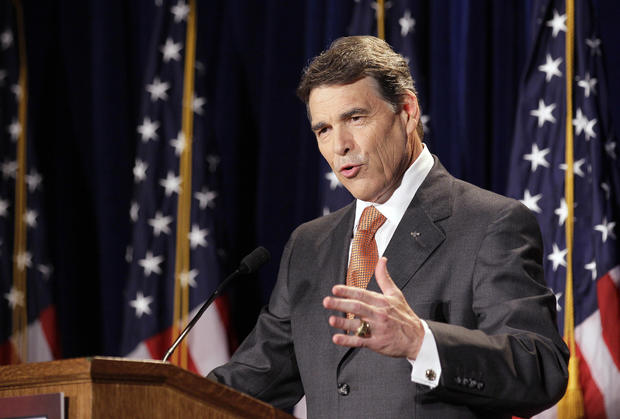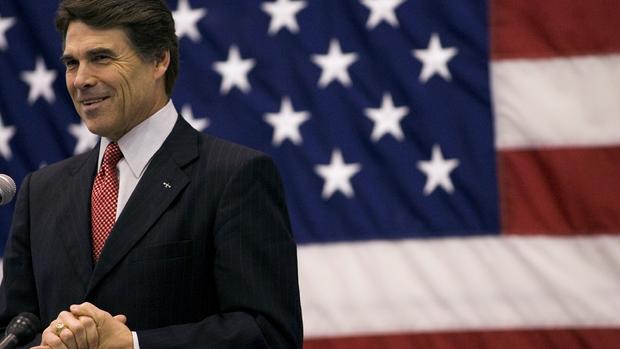Perry urges Americans to take "personal responsibility" on health care, taxes
At an economic roundtable in Dubuque, Iowa today, Republican presidential candidate Rick Perry said he'd like to see more "personal responsibility" in the United States, beginning with increased financial contributions from those receiving government assistance for health care.
The Texas governor was in Iowa to meet with business leaders when he was asked how he would "change the entitlement mindset and attitude."
Perry responded that the government must make "some hard, tough and courageous choices" in order to get the federal budget under control. As he did when he announced his presidential campaign on Saturday, Perry pointed out that not everyone pays federal income taxes.
"I think personal responsibility is one of the very important traits historically of America. And we are approaching nearly half of the United States population doesn't pay any income tax," he said. "And I think we need, one of the ways is to let everybody, as many people as possible... to be helping to pay for the government that we have in this country."
While nearly half of Americans end up not paying federal income taxes, about half of those people still pay federal payroll taxes, according to the Tax Policy Center. Americans are also subject to state and local taxes, sales taxes and more.
While Perry didn't specifically call for increasing income taxes for anyone, he did suggest modifying government assistance for health care costs.
One way to improve personal responsibility, he said, would be "having even a small co-payment for those that are on limited or fixed incomes on their hospital visits -- just a little co-pay where they got a little skin in the game, if you will."
"Rather than just showing up in the emergency room because they know the government is going to pay for it is really beginning to teach people again there is a cost associated with all these programs," he continued, "and that personal responsibility, you know, really begins with each one of us and helping people understand better that the government is not there to be the be all and end all for everything."
In the past, Perry has made much more aggressive statements in favor of scaling back entitlements like Medicare, Medicaid and Social Security.
In an interview with Newsweek last year, conducted ahead of the release of his book "Fed Up," Perry described the entitlement programs as "a Ponzi scheme."
In the interview he also suggested putting Medicare in the hands of states, giving each governor "the freedom from the federal government to come up with his own innovative ways [of] working with his legislature to deliver his own health-care innovations to his citizens."
Also last fall, Perry said on Fox News that he'd "like to see the states be given the opportunity to opt out of the Medicaid program that we are looking at today."
The Washington Post highlights a number of changes to Medicaid that Perry either proposed or attempted to implement. For instance, in 2008, Texas applied for a waiver to limit the number of Medicaid beneficiaries. The waiver was rejected by the Bush administration, and the Texas Medicaid program remains similar to most other states' programs, the Post reported.


